Overview
Understanding the costs associated with 24/7 in-home care is crucial for families navigating their options. It’s important to recognize that these expenses can vary significantly based on factors such as geographic location, the level of support required, caregiver qualifications, and the duration of care. On average, monthly expenses can range from approximately $18,144 for basic personal care to $20,740 for more extensive home health aide services.
As you consider these figures, remember that in-home assistance often proves to be more affordable than alternatives like assisted living or skilled nursing facilities. We understand that making these decisions can feel overwhelming, but knowing the financial landscape can empower you to make informed choices that prioritize your loved one’s comfort and well-being.
In addition, we’re here to support you every step of the way. Your family’s needs are unique, and we are committed to providing compassionate care tailored to those needs. Let us help you explore the best options for your situation, ensuring that your loved one receives the care they deserve.
Introduction
In a world where our aging population is rapidly increasing, the need for 24/7 in-home care has never been more critical. This comprehensive support system serves as a lifeline for individuals requiring assistance with daily activities due to age, illness, or disability, allowing them to maintain their independence and dignity in the comfort of their own homes. As we recognize the growing concern over isolation and mental well-being among seniors, the importance of continuous companionship and care becomes increasingly evident.
With a variety of services available, from personal care to specialized medical support, families often face the challenge of navigating the complexities of in-home care options and associated costs. Understanding these factors is essential for making informed decisions that enhance the quality of life for loved ones while effectively managing financial responsibilities.
We’re here for you, ready to help you explore the options that best suit your family’s needs. Your comfort is our priority, and together, we can ensure that your loved ones receive the care and support they deserve.
Understanding 24/7 In-Home Care: An Overview
Many people find themselves asking, how much does 24/7 in-home care cost for ongoing support tailored to those who need help with daily tasks due to age, illness, or disability? This model ensures that a caregiver is always available, providing essential services such as personal support, medication management, companionship, and mobility assistance. The primary goal is to enhance the quality of life for seniors, allowing them to remain in the comfort of their own homes—a preference that is increasingly common among older Americans.
Recent statistics reveal that one in three adults aged 50-80 experience feelings of isolation at least some of the time. This highlights the critical importance of companionship and support in maintaining mental well-being. Ongoing home support not only addresses physical needs but also combats loneliness, fostering a sense of connection and community. As noted by Activated Insights, “In the United States, there are over 45M seniors. Of this population, based on Medicare stats, we know that approximately 15M of these individuals will end up going to the hospital every year.”
Experts in elderly care emphasize the numerous benefits of round-the-clock support at home. They point out that having a dedicated caregiver can lead to improved health outcomes, especially for seniors managing chronic conditions. For instance, a case study on strategies for enhancing medication adherence among elderly patients demonstrated that consistent caregiver involvement significantly improved adherence rates, resulting in better overall health outcomes.
The trend towards 24/7 in-home assistance is on the rise, driven by seniors’ desire to age in place rather than transition to institutional settings. This shift reflects a broader trend within the health sector, emphasizing personalized support that respects the autonomy and choices of older adults. Best Care Nurses Registry stands out in this landscape, offering tailored assistance and flexibility that cater to the unique needs of every client.
Our private duty RNs and LPNs provide not only medical support but also emotional and social companionship, ensuring that seniors receive comprehensive care that enhances their quality of life.
Moreover, without adequate CNA/HHA caregiver support, seniors may face significant challenges, including health deterioration, poor nutrition, hygiene issues, and increased social isolation. These factors can greatly affect their overall well-being, making the role of caregivers even more vital.
In summary, when considering how much does 24/7 in-home care cost, it’s essential to recognize that it encompasses more than just meeting basic needs; it’s about delivering a holistic approach to support that enhances seniors’ well-being. By providing continuous support, families can alleviate the pressures of caregiving while ensuring their loved ones receive the compassionate care they deserve—an integral part of Best Care’s commitment to quality service since 1980. For more information or to schedule services, please reach out to Best Care Nurses Registry at (888) 203-2529.
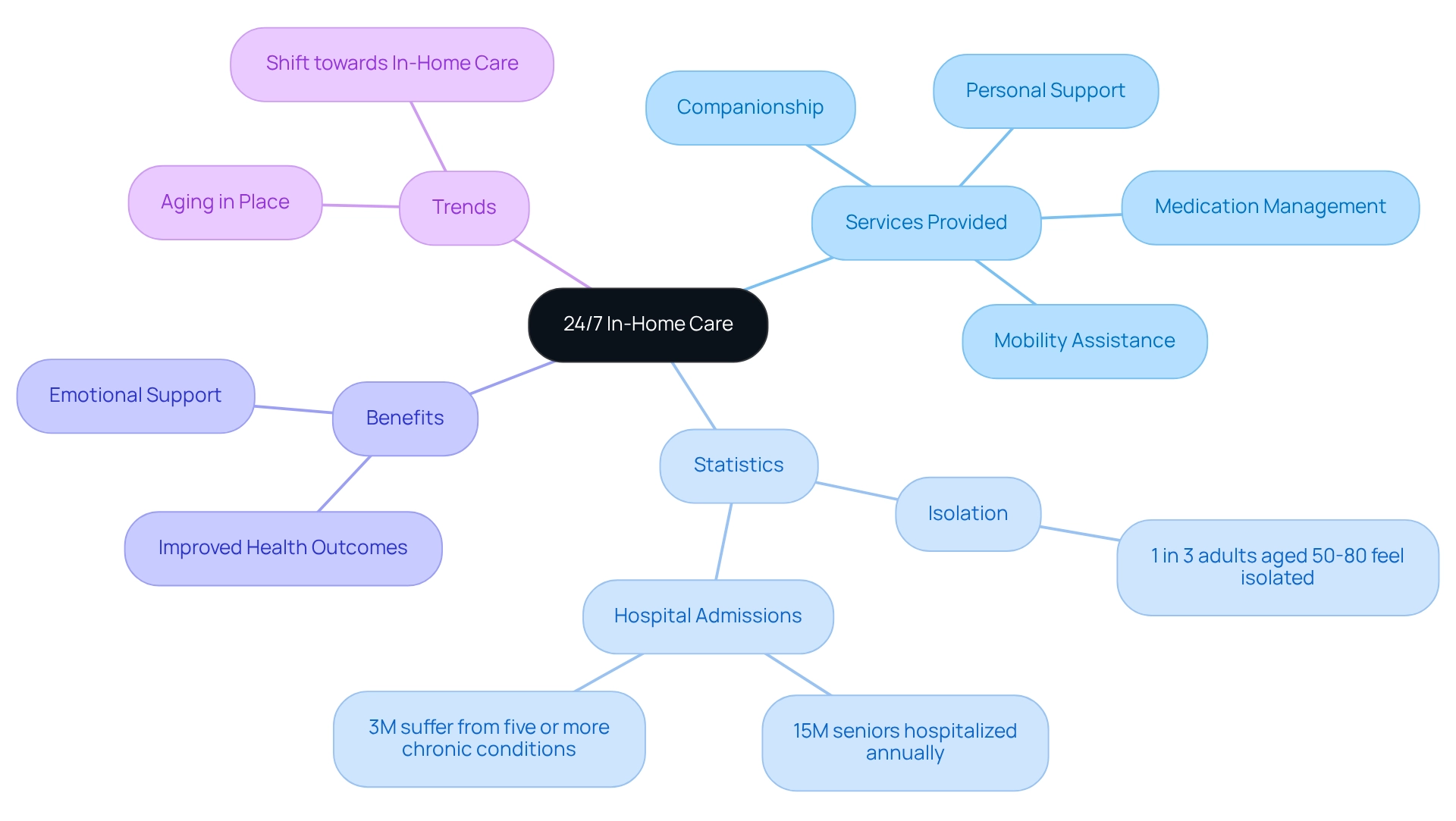
Key Factors Influencing In-Home Care Costs
Several key factors significantly influence the cost of 24/7 in-home care, which families must consider when planning for their loved ones’ needs:
-
Geographic Location: The cost of in-home care can vary dramatically based on the region. Urban areas often see higher rates due to increased demand and living costs, while rural regions may offer more affordable options. For example, in West Virginia, home assistance costs range from $18 to $24 per hour, demonstrating the regional disparities in pricing.
-
Level of Support Required: The complexity of assistance needed plays a crucial role in determining costs. Expert nursing support, which demands specialized training and knowledge, usually commands higher rates compared to basic help, such as companionship or personal assistance. The vital function of CNA/HHA assistance in improving seniors’ health and quality of life cannot be exaggerated, as these caregivers offer crucial support that helps sustain independence and dignity.
-
Caregiver Qualifications: The experience and qualifications of caregivers can also affect pricing. Providers with advanced certifications or specialized skills may charge more for their offerings, reflecting their expertise and the quality of assistance they deliver. Tailored home health assistance from Best Care Nurses Registry guarantees that households receive empathetic support customized to their loved ones’ particular requirements.
-
Duration and Frequency of Care: The total number of hours required each week directly impacts overall costs. Families should evaluate their requirements thoughtfully, as more comprehensive support will naturally result in increased costs. Adaptable home health services enable households to tailor support schedules, guaranteeing that their loved ones obtain the assistance required without excessive financial pressure.
In comparison, assisted living facilities average around $4,500 per month, while nursing homes average $7,908 for semi-private rooms and $9,034 for private rooms. Understanding how much does 24/7 in-home care cost can assist households in assessing the financial consequences of at-home support compared to alternative choices.
Moreover, investigating coverage alternatives for in-home support under long-term care insurance can offer financial assistance for households. Best Care Nurses Registry accepts most long-term support insurances directly, enabling relatives to maximize their benefits and ensure their loved ones receive essential assistance without immediate out-of-pocket costs. As highlighted in a case study, grasping these coverage options enables families to manage the intricacies of insurance and assistance effectively.
As Ella Njike, Founder and CEO, states, “We aim to be an active partner in your support, not to take over.” You are the CEO of your well-being, and we support you in managing it effectively. This emphasizes the significance of relative participation in management, ensuring that choices correspond with the needs and preferences of seniors.
Ultimately, it’s important to mention that occupancy rates for assisted living facilities have risen from 77% to 84% annually, which may affect demand and pricing for in-home support. By considering geographic location, the amount of assistance needed, caregiver qualifications, and the length of support, families can make informed choices that align with their financial capabilities while ensuring their loved ones receive the essential help.
To discuss your specific needs and schedule a call with Best Care Nurses Registry, please call (888) 203-2529. It is vital to acknowledge that without CNA/HHA assistance, seniors may experience health declines, poor nutrition, hygiene issues, mobility challenges, social isolation, household hazards, and medication management problems. Making certain that your loved ones obtain the suitable support is vital for their well-being.
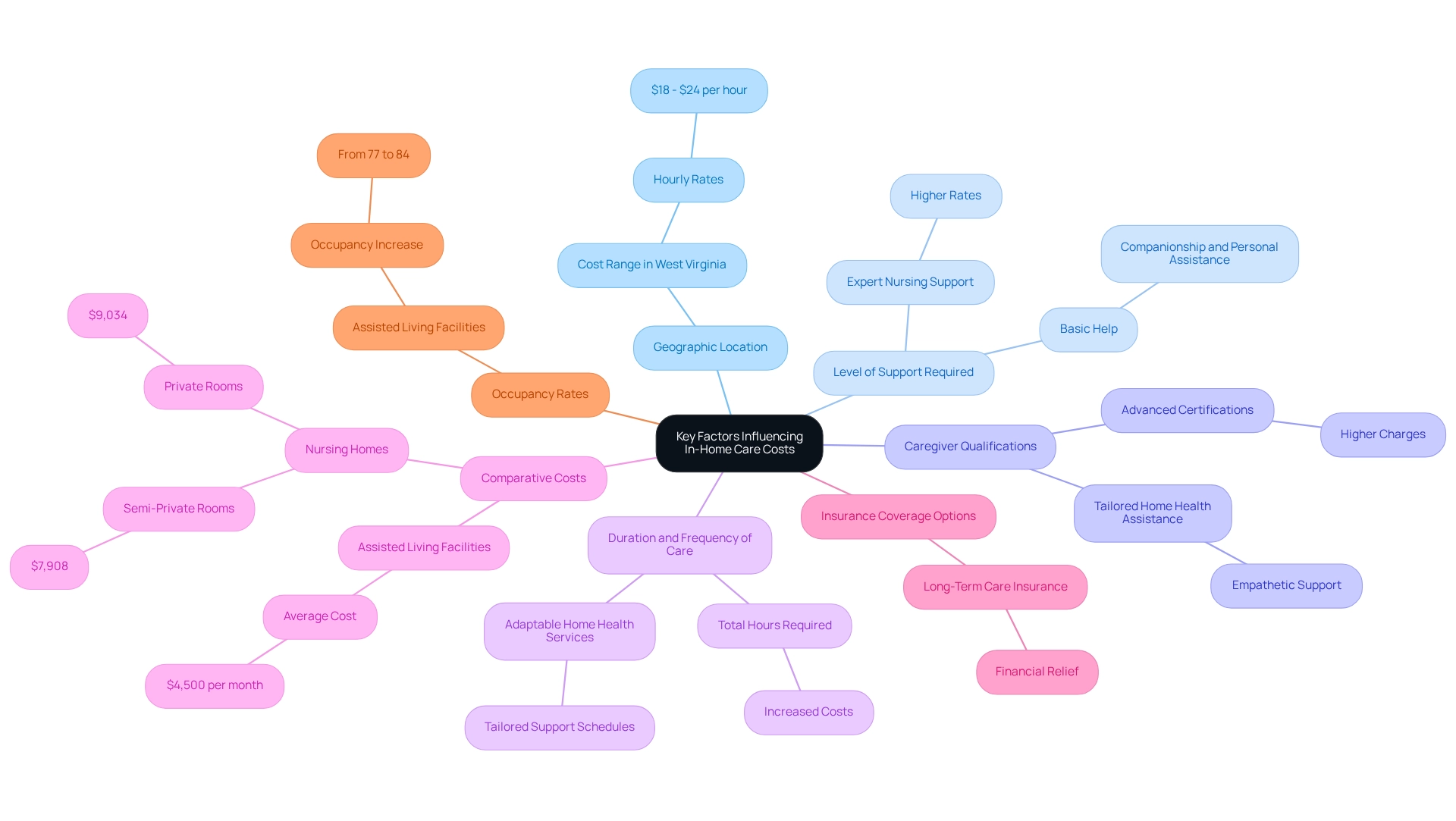
Types of In-Home Care Services and Their Costs
In-home assistance options can be classified into various unique categories, each designed to address specific requirements:
-
Personal Assistance Options: These options help individuals with everyday tasks such as bathing, dressing, and grooming. The typical expense for personal assistance options varies from $25 to $35 per hour, making it a feasible choice for individuals who need support with everyday tasks but do not require medical help. Personal attention is essential for upholding hygiene and avoiding health issues, ensuring seniors stay comfortable and healthy.
-
Home Health Aide Services: For individuals requiring medical assistance, home health aides offer skilled support, which usually averages between $30 and $50 per hour. This assistance is vital for individuals with chronic conditions or recovering from surgery, as it merges personal support with medical supervision. The presence of CNAs and HHAs not only aids in managing health conditions but also guarantees that family members are kept informed about their loved one’s health status.
-
Companion Support: Focused on providing companionship and social interaction, companion support generally costs around $20 to $30 per hour. This assistance is especially advantageous for seniors who may feel isolated and require someone to interact with them socially. Emotional assistance from providers can substantially reduce feelings of isolation and enhance overall mental well-being.
-
Tailored Assistance: Specific conditions, like dementia or recuperation from surgery, may require tailored assistance. These offerings often necessitate caregivers with particular training, which can result in increased expenses. The customized method of specialized assistance guarantees that seniors obtain the attention and support necessary for their distinct circumstances.
Given that the satisfaction rate for hospital treatment is only 55.4%, the significance of at-home support options becomes clear. Families can gain from the knowledge of home health service experts, who stress that selecting the appropriate kind of assistance can greatly influence the quality of life for their loved ones. Furthermore, citing case studies that contrast home-based interventions with hospital treatments can offer additional proof of the efficacy of at-home solutions.
By assessing these various kinds of domestic assistance options and considering how much does 24/7 in home care cost, relatives can make knowledgeable choices that best meet the requirements of their loved ones.
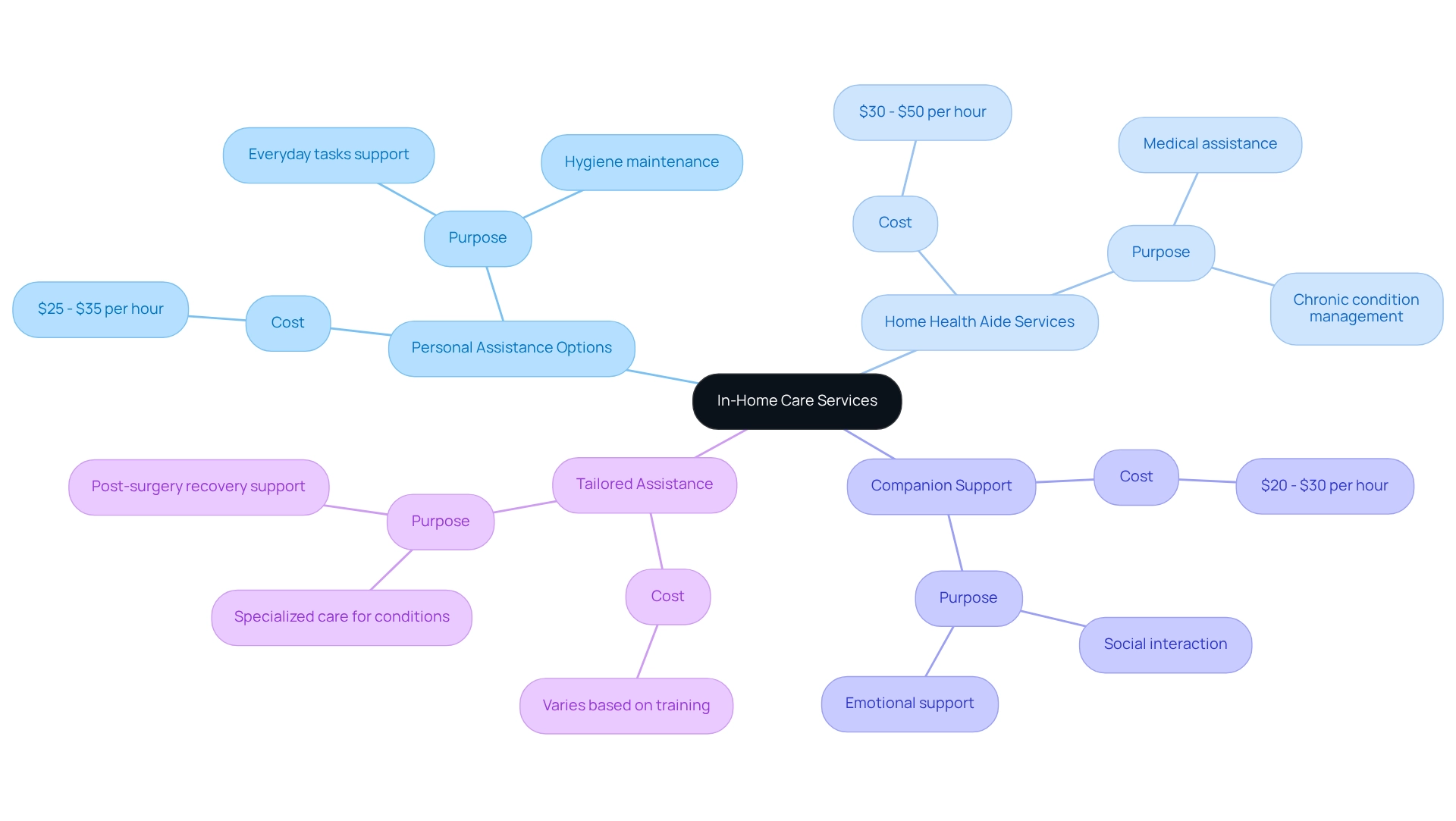
State-by-State Cost Analysis of In-Home Care
The expense of round-the-clock domestic assistance raises a critical question: how much does 24/7 in-home care cost? This cost can vary significantly across the United States, influenced by factors such as the cost of living, demand for support, and regional wage rates. For instance:
- In California, average expenses can reach around $40 per hour, reflecting the high cost of living and demand for skilled caregivers.
- In Texas, rates may hover around $25 per hour, benefiting from a lower cost of living and a competitive market for home assistance services.
- Florida sees an average rate of about $30 per hour, corresponding with the state’s growing senior population and increasing demand for in-home support.
- Meanwhile, in New York, costs can soar to $45 per hour, driven by the high cost of living and the concentration of healthcare services in urban areas.
These variations highlight the importance of families conducting thorough research on how much 24/7 in-home care costs in their specific state. Understanding these costs is essential, especially as senior support expenses are expected to rise substantially in the coming years. For example, home health services costs are projected to double by 2030, while assisted living expenses are anticipated to increase by nearly 47%.
Furthermore, occupancy rates for assisted living facilities have risen from 77% to 84% annually, emphasizing the growing need for in-home assistance.
Without CNA/HHA caregiver support, seniors may face various challenges, including:
- Health deterioration due to a lack of medical supervision
- Poor nutrition from insufficient meal preparation
- Hygiene issues leading to infections
- Mobility difficulties heightening fall risks
- Social isolation contributing to depression
- Medication mismanagement
Tailored home assistance options, like those offered by Best Care Nurses Registry, play a crucial role in enhancing the quality of life for seniors. These services not only assist with daily living activities but also ensure that seniors receive the emotional support and companionship they need to maintain their independence and dignity.
By utilizing financial support alternatives such as long-term care insurance, Medicaid, and veterans benefits, households can significantly reduce their personal costs for at-home services. Best Care Nurses Registry seeks to enhance these long-term support insurance advantages and provides multiple payment options to assist families in this endeavor. As Jeff Hoyt, Editor-in-Chief of MoneyTips.com, emphasizes, efficient financial planning is vital for managing the expenses related to at-home assistance.
The case study titled ‘Leveraging Financial Assistance for In-Home Care’ illustrates how families can effectively utilize these financial resources, alleviating financial stress while ensuring that their loved ones receive the necessary support tailored to their unique needs.
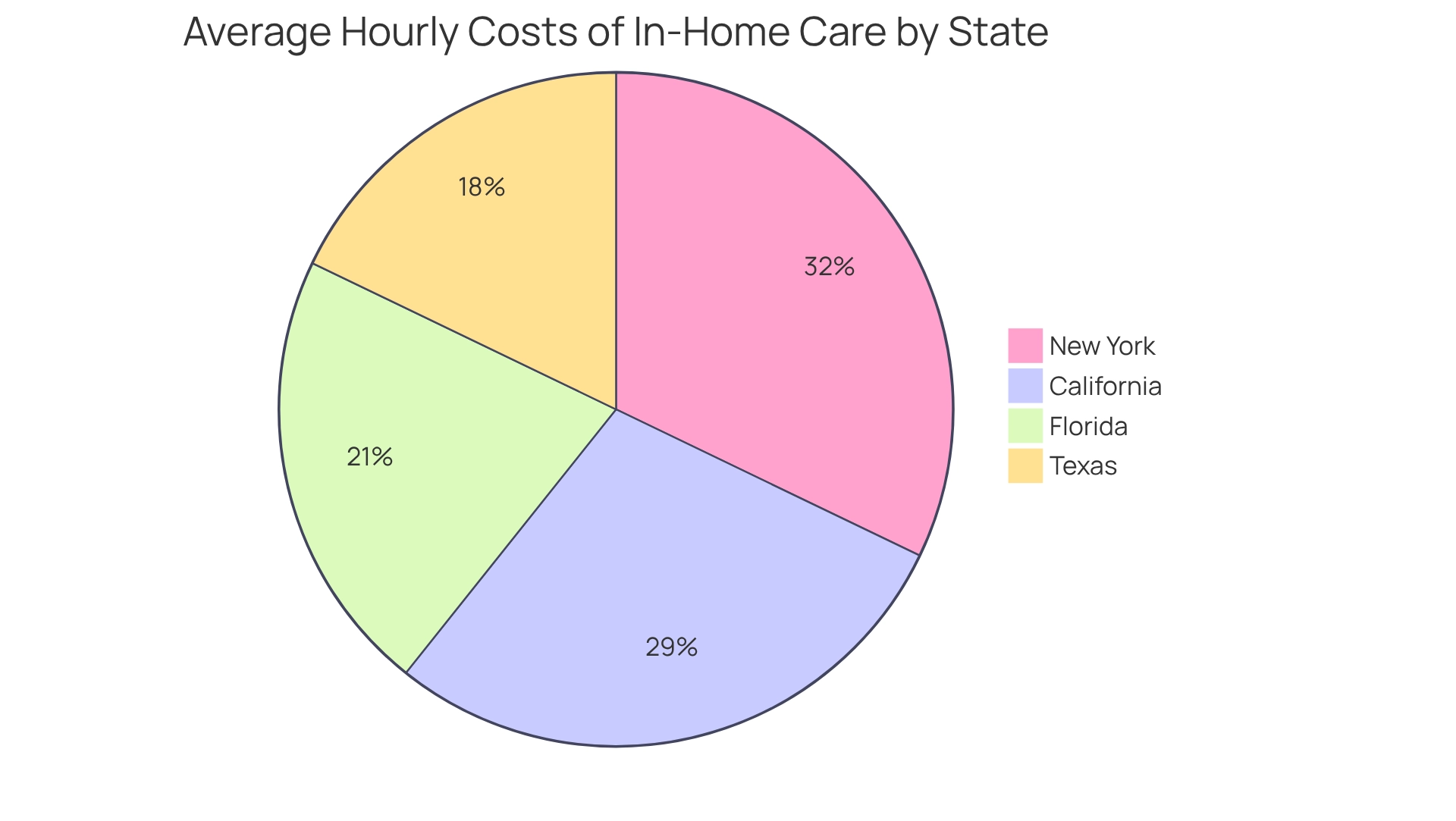
Exploring Payment Options for 24/7 In-Home Care
Families have various financing options available for 24/7 in-home care, each catering to different needs and circumstances:
- Private Pay: Many families choose private pay, which involves out-of-pocket expenses for services. This option allows for flexibility in selecting providers and customizing offerings to meet personal requirements.
- Long-Term Care Insurance: Numerous policies are designed to cover in-home assistance expenses, though coverage specifics can vary significantly by plan. At Best Care Nurses Registry, we accept most Long Term Care insurances directly on your behalf, simplifying the payment process. Most carriers require a form called an assignment of benefits (AOB) to be completed by the policyholder, enabling you to direct the carrier to pay us directly. We handle all necessary paperwork and can often start services immediately, depending on your policy’s terms. It’s important to understand that while Medicare does not cover tasks of daily living provided by private duty aides, knowing your long-term support policy can significantly ease the financial burden associated with long-term assistance. The National Long-Term Care Survey (NLTCS) indicates that this insurance covers at least 97% of the U.S. community-dwelling and institutional elderly population aged 65 and older, highlighting its importance in financing in-home care. However, please note that you will be responsible for payment if your carrier does not cover any or part of the bill. Additionally, while many policies allow for prompt initiation without out-of-pocket payment, this may be subject to an elimination period, the duration established at policy purchase before benefits begin.
- Medicaid: This government program offers support for qualified individuals, encompassing a variety of in-home care options. Eligibility requirements can vary by state, making it essential for families to research local guidelines. Recently proposed regulations may increase payment rates for long-term assistance and supports (LTSS), although they currently lack new federal financing, leading to uncertainty regarding funding sources for these increases.
- Veterans Benefits: Veterans may qualify for specific programs that assist with expenses related to home assistance, including Aid and Attendance benefits, which can significantly reduce out-of-pocket costs for eligible veterans and their families.
- Health Savings Accounts (HSAs): Funds from HSAs can be utilized for qualified medical expenses, including in-home assistance services. This option enables families to use pre-tax funds to cover expenses, providing a financial advantage.
Understanding the cost of 24/7 in-home care is vital for families looking to manage the financial strain of assistance effectively. Recent statistics show that a significant number of families utilize long-term support insurance for in-home assistance, underscoring its importance in financial planning for senior care. Furthermore, professional insights reveal that understanding the interplay between informal support and formal assistance can influence decisions regarding paid help.
A case study titled ‘Impact of Informal Support on Home Assistance Services’ illustrates that higher levels of informal help correlate with reduced reliance on formal home support services, indicating that family support can lessen the need for paid assistance. By exploring these funding options, families can ensure their loved ones receive the essential support they need while maintaining financial stability. France Weaver emphasizes the importance of understanding these financing choices, noting that informed decisions can significantly impact the quality of care received.
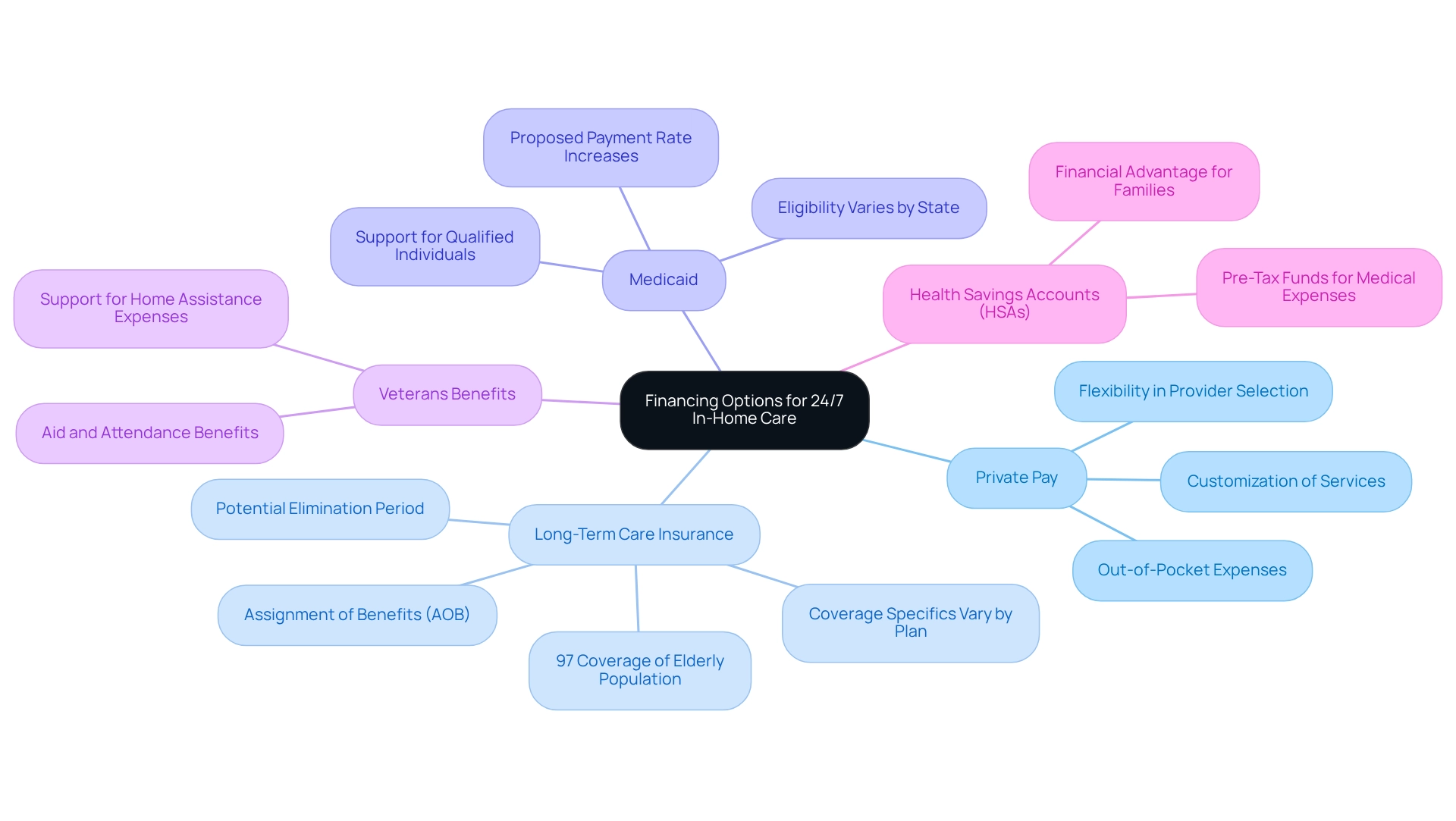
Average Costs of 24/7 In-Home Care: What to Expect
As of 2025, families considering 24/7 in-home care can expect the following average costs:
- $18,144 per month for basic personal care services, which typically include assistance with daily activities such as bathing, dressing, and meal preparation provided by CNAs and HHAs from Best Care Nurses Registry.
- $20,740 monthly for more extensive home health aide services, which may include skilled nursing assistance and additional medical support customized to individual needs. This leads to the inquiry of how much does 24/7 in-home care cost.
- Clients can expect to pay $792 per day for ongoing support and supervision.
These figures serve as a helpful standard for households as they navigate the financial terrain of in-home assistance. It’s important to recognize how much does 24/7 in-home care cost, as actual expenses may vary based on factors such as location, the specific assistance required, and the level of support needed. Understanding these costs is essential for households to plan efficiently and ensure their loved ones receive the necessary assistance without facing financial pressure.
Moreover, households should contemplate the advantages of 24/7 live calling assistance from Best Care Nurses Registry, which enables clients to communicate with a real person in 30 seconds or less, offering reassurance regarding the availability of support services. A case study titled “How Much Does In-Home Care Cost Per Day?” highlights the significance of comprehending the financial consequences of in-home support compared to assisted living establishments and nursing homes, stressing the necessity for families to prepare accordingly.
As Laura Adams wisely noted, “If you spend all your money on your aging parents, you’re going to be relying on loved ones to pay for you. It’s a downward spiral.” This underscores the importance of financial planning in caregiving.
Furthermore, initiating home assistance early can support seniors in remaining at home longer, preventing problems such as social isolation and inadequate nutrition. The vital functions of CNA and HHA caregivers from Best Care Nurses Registry in delivering individualized support not only improve seniors’ quality of life but also assist in preserving their independence and dignity. Dr. Ella Njike, founder and CEO of Global One Home Care, highlights the importance of building authentic relationships and promoting emotional wellness in the context of at-home support, which contributes a compassionate viewpoint to the financial conversation.
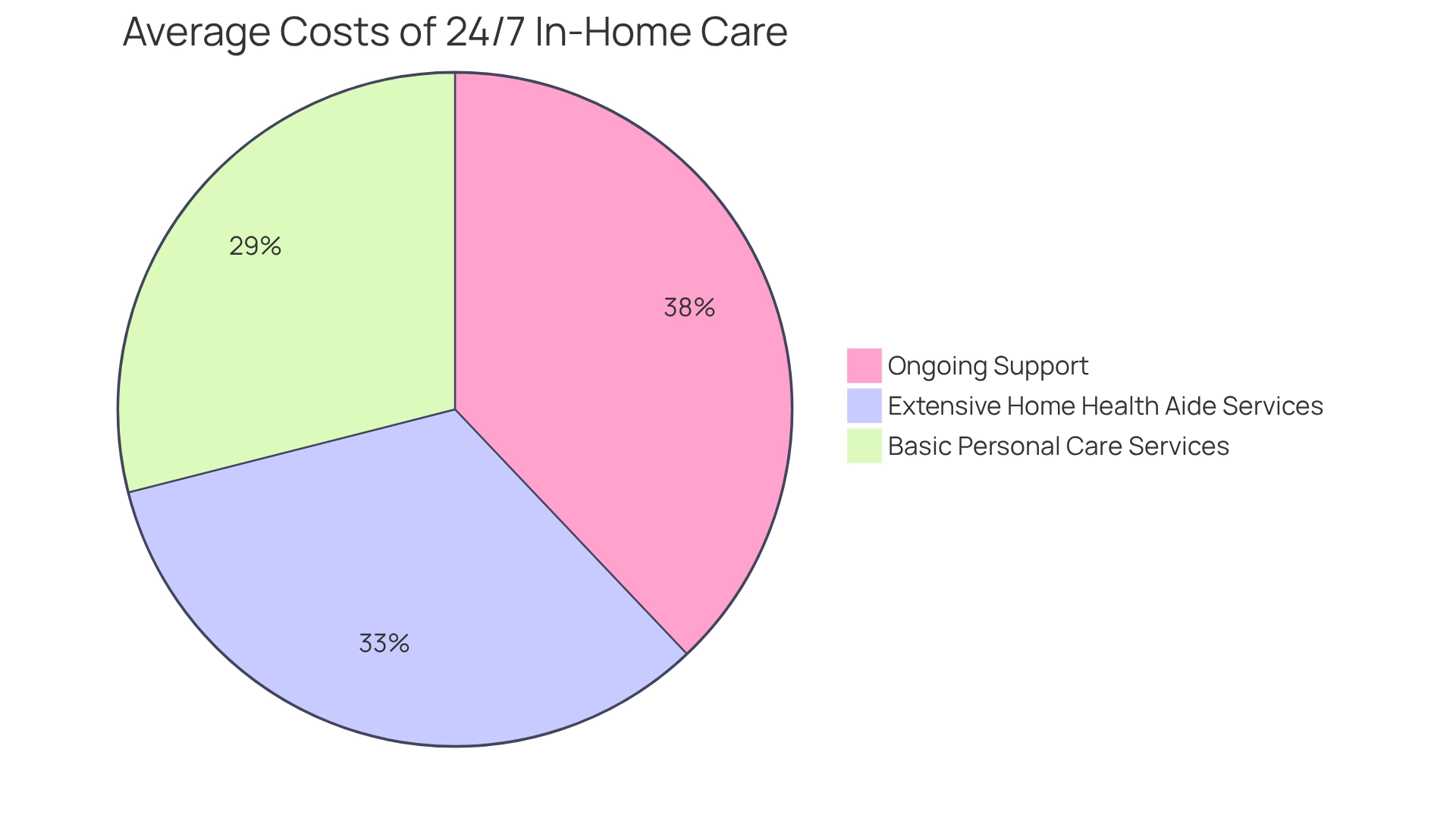
Choosing the Right Caregiver: Factors to Consider
Choosing the right provider is a crucial decision, especially when considering the cost of 24/7 in-home care, as it can significantly influence the quality of life for your loved one. Here are some key factors to consider:
-
Experience and Qualifications: It’s essential to ensure that the caregiver has the necessary training and experience tailored to your loved one’s specific needs. Certified Nursing Assistants (CNAs) typically undergo comprehensive training focused on medical procedures, while Home Health Aides (HHAs) prioritize personal assistance and daily living tasks. Caregivers with specialized skills can provide more effective support, especially for individuals with chronic illnesses or complex medical needs. In fact, 56.5% of caregivers found it very helpful to have a service that delivers medications to their home, highlighting how practical support enhances their effectiveness.
-
Compatibility: The caregiver’s personality and approach should align with your loved one’s preferences. Compatibility fosters a trusting relationship, which is vital for efficient support. Studies suggest that caregivers who feel content with their own well-being are more likely to offer better support, demonstrating the importance of a suitable match. As noted by JCS, “One of the more intriguing discoveries of this work is that caregivers were more content with their own support than non-caregivers but faced greater difficulties in obtaining services.”
-
References and Background Checks: Always verify the caregiver’s credentials and seek feedback from previous clients. This step not only ensures that the caregiver is qualified but also provides insight into their reliability and professionalism. Consistent communication with the caregiver and the home support agency is essential for preserving quality assistance and addressing any issues promptly.
-
Communication Skills: Effective communication is paramount. A caregiver should be capable of interacting with both the client and their family, ensuring that everyone is informed and comfortable with the assistance being provided. This is particularly important for maintaining a collaborative approach to health management. Studies have highlighted the necessity for coordinated support models for caregivers, underscoring the challenges they encounter and the advantages of a nurturing assistance setting.
Taking the time to evaluate these factors can lead to a more positive caregiving experience, ultimately enhancing your loved one’s well-being. Research has shown that caregivers who are well-suited to their clients report higher satisfaction levels, which can lead to improved outcomes. By prioritizing experience, compatibility, thorough vetting, and communication, families can make informed decisions that support their loved ones’ health and happiness.
Additionally, recognizing the risks faced by seniors without CNA/HHA services—such as health decline, poor nutrition, and social isolation—underscores the importance of understanding the cost of 24/7 in-home care for an enhanced quality of life.
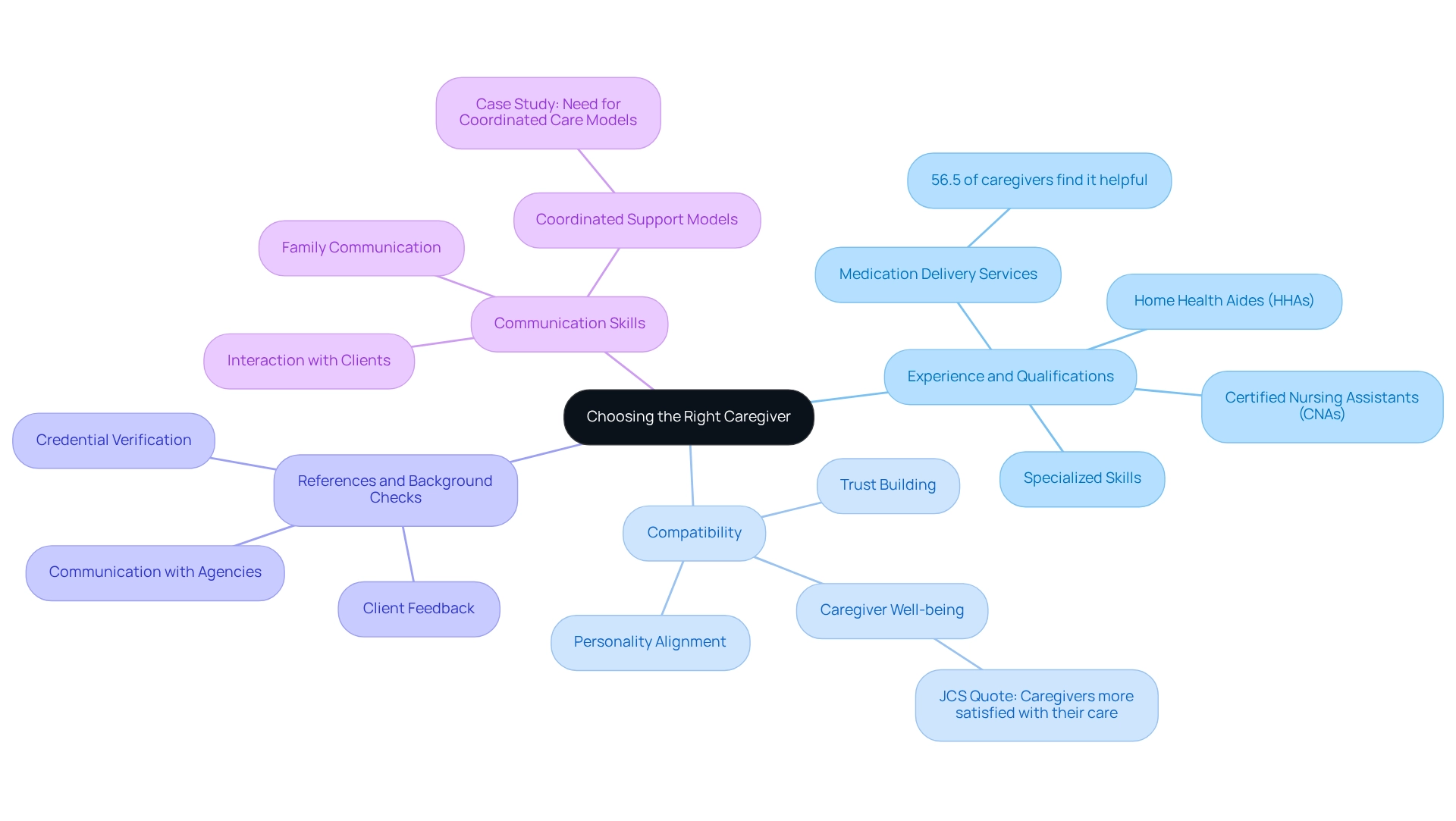
Debunking Myths: What In-Home Care Really Costs
Numerous myths persist regarding the costs associated with in-home care, which can lead to confusion for families considering this option:
-
Myth 1: In-home care is only for the wealthy.
Fact: Contrary to this belief, many families discover that the cost of 24/7 in-home care is often more affordable than expected, especially when compared to the expenses of assisted living facilities. For instance, the typical monthly expense for home assistance is roughly $4,099, while assisted living can amount to about $3,750. As financial expert Matt Dean points out, “Just think about how these monthly expenses will impact your finances: $4,099 for home support, $3,750 for assisted living, $8,121 for skilled nursing.” This makes at-home assistance a feasible choice for a wider variety of families. -
Myth 2: All at-home assistance is identical.
Fact: The expenses of in-home assistance can differ greatly depending on various elements, such as the kind of support needed, the qualifications of the provider, and the geographical area. This variability indicates that families should thoughtfully evaluate their specific needs and investigate various options, including the cost of 24/7 in-home care, to find the best match. Best Care Nurses Registry, for instance, sets itself apart through tailored service and adaptability, enhancing the affordability of assistance. With a focus on activities of daily living, such as bathing, grooming, and meal preparation, Best Care ensures that clients receive personalized support that enhances their quality of life. -
Myth 3: Insurance covers all expenses related to at-home assistance.
Fact: Insurance coverage for at-home support can vary significantly among providers and policies. While Best Care Nurses Registry accepts most Long Term Care insurances directly on behalf of clients, understanding the nuances of insurance coverage is crucial for effective financial planning. This often involves completing an Assignment of Benefits (AOB) form, allowing the insurance carrier to pay Best Care directly. Families may still find themselves responsible for out-of-pocket expenses, especially if their policy has specific requirements or an elimination period before coverage begins.
By dispelling these misconceptions, households can approach at-home assistance with a more informed viewpoint, acknowledging the cost of 24/7 in-home care along with its potential advantages and cost-effectiveness. In fact, a substantial proportion of households indicate that in-home assistance is a manageable cost, dispelling the idea that it is exclusively for wealthy residences. Expert insights highlight that home assistance not only supports seniors in preserving their independence but also nurtures meaningful relationships and community connections, making it a valuable option for many.
Testimonials from satisfied clients further illustrate the positive impact of Best Care’s services, reinforcing the notion that personalized home care is accessible and beneficial for all families.
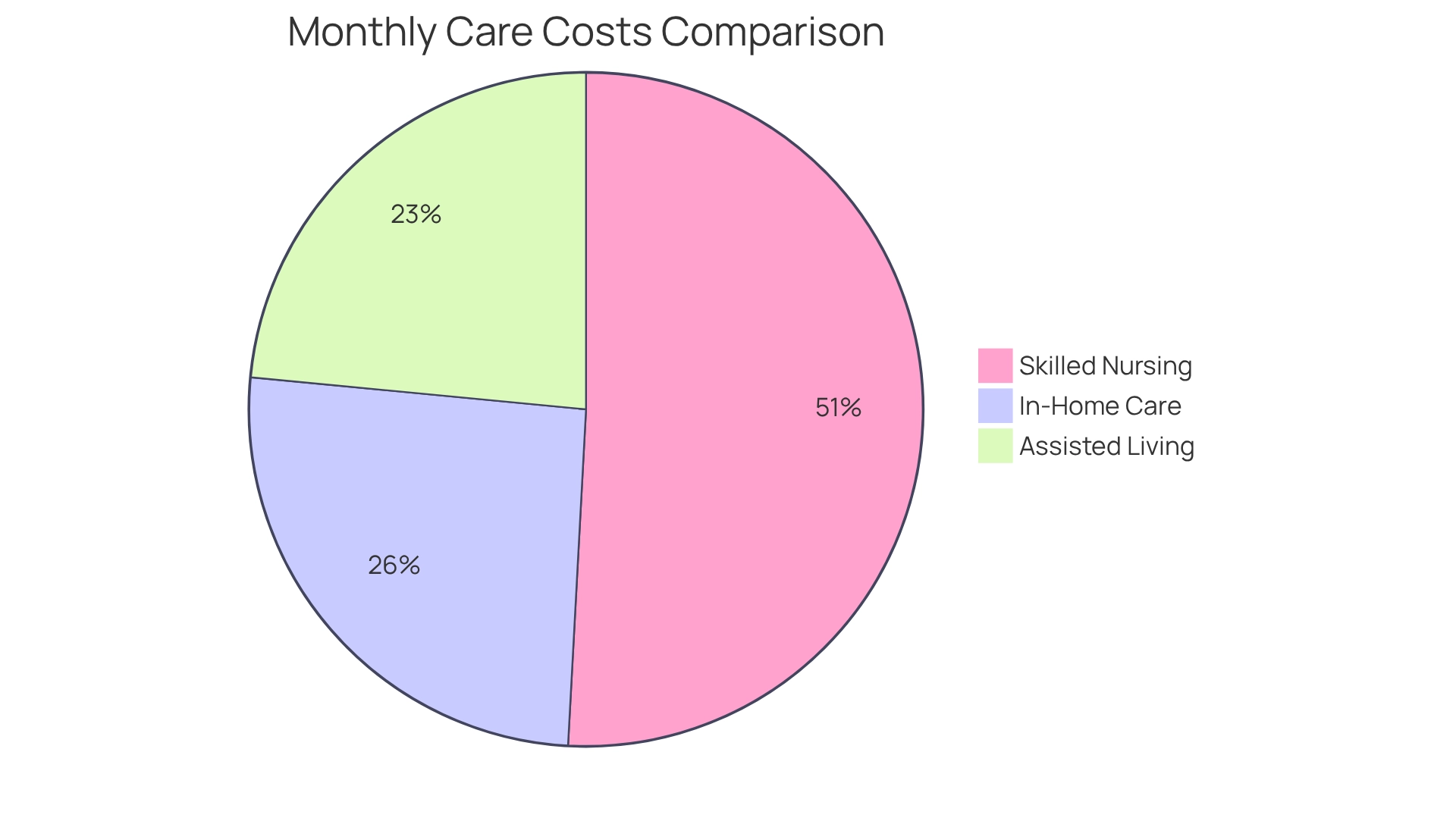
Conclusion
24/7 in-home care serves as a vital resource, addressing the growing needs of our aging population. By focusing on enhancing the quality of life for seniors, this comprehensive care model considers not only physical health but also emotional and social well-being. Families are empowered to make informed decisions about care options, gaining an understanding of the various services available, associated costs, and the significance of choosing the right caregiver.
Navigating the complexities of in-home care can feel overwhelming, yet recognizing key factors influencing costs—from geographic location to caregiver qualifications—enables families to evaluate their options effectively. The notable differences in costs compared to assisted living and nursing facilities underscore the affordability and flexibility that in-home care provides, making it an appealing choice for many families.
Ultimately, ensuring that our loved ones receive the appropriate care is essential for their health and overall happiness. By leveraging available financial options and appreciating the true value of personalized in-home care, families can offer their seniors the dignity and independence they deserve. As the demand for in-home care continues to rise, prioritizing compassionate, tailored support will be crucial in enhancing the lives of older adults across the country. Remember, we’re here for you as you navigate this journey.
Frequently Asked Questions
What is the cost of 24/7 in-home care for seniors?
The cost of 24/7 in-home care varies significantly based on geographic location, level of support required, caregiver qualifications, and duration and frequency of care. For example, in West Virginia, home assistance costs range from $18 to $24 per hour.
What services are included in 24/7 in-home care?
24/7 in-home care includes essential services such as personal support, medication management, companionship, and mobility assistance, aimed at enhancing the quality of life for seniors.
Why is companionship important in in-home care?
Companionship is crucial as many older adults experience feelings of isolation. Ongoing home support not only addresses physical needs but also combats loneliness, fostering a sense of connection and community.
How does the level of support required affect the cost of in-home care?
The complexity of assistance needed plays a significant role in determining costs. Expert nursing support, which requires specialized training, typically commands higher rates compared to basic companionship or personal assistance.
How do caregiver qualifications influence the cost of in-home care?
The experience and qualifications of caregivers can affect pricing. Providers with advanced certifications or specialized skills may charge more, reflecting the quality of assistance they deliver.
How does the duration and frequency of care impact overall costs?
The total number of hours required each week directly impacts costs. More comprehensive support will naturally result in increased expenses, so families should evaluate their needs carefully.
How do the costs of in-home care compare to assisted living facilities and nursing homes?
Assisted living facilities average around $4,500 per month, while nursing homes average $7,908 for semi-private rooms and $9,034 for private rooms. This comparison can help families assess the financial implications of at-home support versus other options.
Are there financial assistance options for in-home care?
Yes, investigating coverage options under long-term care insurance can provide financial assistance. Best Care Nurses Registry accepts most long-term support insurances directly, helping families maximize their benefits.
What are the risks for seniors without adequate caregiver support?
Without adequate caregiver support, seniors may face health deterioration, poor nutrition, hygiene issues, increased social isolation, and challenges in medication management, which can significantly affect their overall well-being.











